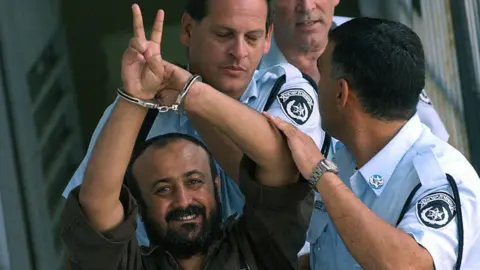The delicate negotiations between Israel and Hamas have reached a critical juncture as the militant group demands the inclusion of prominent Palestinian prisoners in an upcoming exchange deal. This development comes as Israel prepares to release 250 Palestinian prisoners in exchange for 20 Israeli hostages held in Gaza.
At the center of the dispute are two notable Palestinian figures: Marwan Barghouti, serving multiple life sentences for orchestrating deadly attacks, and Ahmad Saadat, the Popular Front for the Liberation of Palestine leader imprisoned for terrorist activities. Both men have been excluded from Israel’s preliminary release list, despite their significant symbolic importance to the Palestinian cause.
The exchange, scheduled to commence Monday at 12:00 local time, represents the first phase of a broader ceasefire agreement brokered by the United States. The deal encompasses not only the release of living hostages but also the return of deceased captives’ remains, with at least 26 hostages confirmed dead and two others’ status unknown.
Israel’s justice ministry has published a list of 250 prisoners eligible for release, including Iyad Abu al-Rub, an Islamic Jihad commander convicted of orchestrating suicide bombings that claimed 13 Israeli lives in the early 2000s. The ministry stipulates that al-Rub must either relocate to Gaza or face deportation abroad.
Marwan Barghouti’s case presents particular significance, as he maintains substantial popular support among Palestinians. Currently serving five life sentences plus 40 years for his role in attacks that resulted in five civilian deaths, polls consistently show him as the preferred choice for Palestinian leadership over both current Palestinian Authority President Mahmoud Abbas and Hamas officials.
The agreement’s broader scope includes the release of approximately 1,700 Palestinians from Gaza currently held in Israeli detention. However, the exclusion of high-profile prisoners threatens to complicate the carefully negotiated arrangement. While American diplomatic channels have promised to address these concerns with Israeli Prime Minister Benjamin Netanyahu, Israel maintains its firm stance against including certain prisoners.
This prisoner exchange represents a crucial test for the ceasefire agreement aimed at ending two years of conflict in Gaza. The successful implementation of this initial phase could pave the way for broader peace initiatives, while failure risks reigniting tensions in an already volatile region.
The international community watches closely as both sides navigate these sensitive negotiations, with the lives of hostages and the prospect of regional stability hanging in the balance. The coming days will prove critical in determining whether this agreement can overcome its current challenges and proceed as planned.

